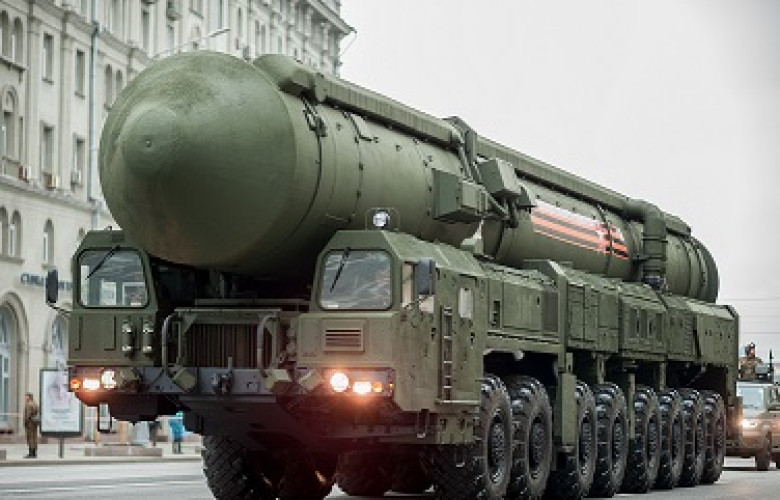Why Trump 2.0 is Not Good News for Sino-US Arms Control
Syed Ali Zia Jaffery, The University of Lahore
2025-01-14
AMERICA
DEFENCE AND SECURITY
This article first appeared on the Australian Institute of International Affairs 'Australian Outlook'

Understanding how Chinese leaders frame the issue, while toning down the rhetoric, is likely to go further toward developing mutual security in arms control negotiations.
Elbridge Colby, the author of The Strategy of Denial: American Defense in an Age of Great Power Conflict, and the incoming Undersecretary of Defense for Policy, has long seen China’s growing military power as the biggest threat to US interests. At an event in 2022, he said China is “actively preparing for conflict. My view is to prevent them from dominating Asia without a war. But the only prudent way is to be prepared to fight to show Beijing that there is nothing to gain by initiating conflict.” Colby’s view represents the “peace through strength” mantra, which centres on countering China’s burgeoning military power. Having authored the China-centric 2018 US National Defense Strategy, Colby is expected to use such an approach in dealing with China. More notably, his ideas will have many takers in the second Trump administration, likely filled, once again, with China hawks. This essentially also means that Donald J. Trump’s return to the Oval Office is not good news for one of the most contentious issues between Washington and Beijing: arms control. There are two reasons why this might be the case.
Political stability is essential for arms control
First, a renewed focus on countering China will increase political instability. Given China believes political stability feeds into nuclear stability, this will be a death knell for all bilateral discussions between the two countries. The effects of political tensions, however, will be more pronounced in the realm of arms control. This is primarily because China sees a political role for its nuclear weapons: to act as a strategic counterbalance against an aggressive United States. Another factor that makes political turbulence problematic for arms control is that China’s nuclear modernisation is not driven by US technological advancements. In a recent conversation, Tong Zhao, a US-based Chinese nuclear scholar, made this point while adding that Beijing believes its strategic capabilities will soften US policy towards it. According to this position, as political temperatures rise, the Chinese will likely come to view arms control as a US effort to reduce China’s strategic capabilities.
Second, if influential US officials believe defending Taiwan is critical, China might become apprehensive about that territory and the US support to it. What is notable is that Colby has advocated for defending Taiwan against Chinese aggression, widely perceived as aimed at the island’s takeover. He argues that US failure to prevent Taiwan’s fall will not only dent Washington’s credibility but also contribute to swinging the global balance of power in China’s favor. With China’s national identity tied to “reunification” with Taiwan, such statements are likely to further push Beijing to resort to nuclear signaling.US-based scholars have contended that fear of an escalation of military hostilities with the US will lower the threshold for nuclear coercion. One reason why this might be the case is China’s interest in developing nuclear capabilities for managing escalation in Taiwan. Beijing feels that it needs to develop tailored nuclear capabilities that can coerce the US in a potential military conflict in Taiwan. This desire to augment escalation management prowess will only increase as a result of such Taiwan-specific hawkish views.
All this will further attenuate the prospect for arms control. Certainly, if China is anticipating a military conflict with the US over Taiwan, it is less likely to contemplate putting limits on its nuclear forces. In fact, this fear will increase the likelihood of miscalculation and inadvertent escalation. In the process, China’s position on US arms control overtures will stand vindicated.
Listen to China
At a time of increasing nuclear risk and uncertainty, a hardening of positions will not augur well for international security. The resultant absence of arms control arrangements between the US and China will only go on to increase these risks and exacerbate threats to international security. This not only shows how the erosion of arms control could be but also highlights why reinforcing it is absolutely necessary.
The traditional US approach to arms control is hardly going to end this deadlock. This is primarily because Beijing’s insistence on treating nuclear stability as a product of political stability makes arms control a non-starter. This position explains China’s consistent refusal to engage in arms control-related discussions with the US. It is also one reason why Chinese leaders believe arms control will reduce, not enhance, mutual security. More specifically, unlike the erstwhile Soviet Union, China is not necessarily perturbed about the security implications of US nuclear modernisation. If anything, it is worried that arms control will give the US a strategic edge in the political arena. This line of thinking would only change if the political dynamic is acknowledged as a critical stumbling block in Sino-US arms control. This means that Washington should not only acknowledge the salience of the political rivalry but also engage Beijing in order to navigate it. Focusing on the political sources of insecurity is the only way for the US to assure China that arms control is part of greater efforts to stabilise Sino-US relations. For the US, a good starting point in this regard would be to lower the rhetoric on China.
Membership
NZIIA membership is open to anyone interested in understanding the importance of global affairs to the political and economic well-being of New Zealand.